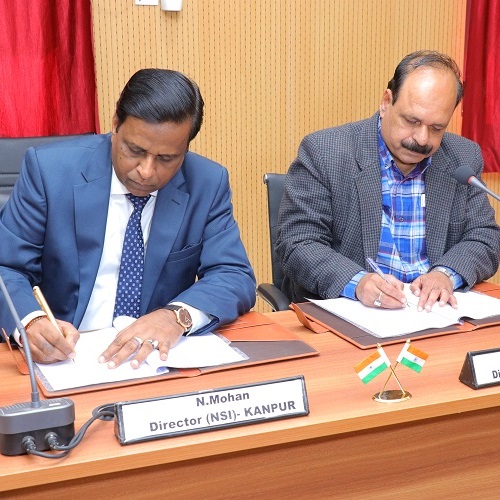Kanpur: In order to promote bio-ethanol production so as to cope up with the requirement for 10% blending in petrol, National Sugar Institute, Kanpur and ICAR-Indian Institute of Millets Research, Hyderabad joined hands for working together so as to develop varieties of “Sweet Sorghum” and suitable technologies for producing ethanol from it. The two institutes signed a Memorandum of Understanding today at National Sugar Institute, Kanpur.
The MoU is aimed at undertaking collaborative research and development projects on exploiting potential of sweet sorghum for ethanol production. As per the understanding, testing of promising sweet sorghum genotypes developed by ICAR-IIMR, Hyderabad, suitable for planting in February and June/July in Northern India shall be carried out at the National Sugar Institute farm. Thereafter, the study of processing technique and ethanol production potential from different sweet sorghum varieties shall be carried out at NSI, Kanpur. In addition to it we shall explore possibilities of utilizing sweet sorghum syrup in beverage and confectionary industry, said Prof. Narendra Mohan, Director, National Sugar Institute, Kanpur.
Sweet sorghum may be considered as a potential crop for ethanol production in northern India as it is a warm-season crop that matures earlier under high temperatures and short days. It tolerates drought and high-temperature stress better than many crops, but it does not grow well, under low temperatures, informed Dr. Vilas Tonapi, ICAR-IIMR, Hyderabad. It is about 4 months crop which requires much lesser irrigation water than the sugarcane crop, he further added. A crop yielding 40t fresh stalk/ha, upon juice extraction @ 60% would yield about 3.0 tons jaggery and 3.5 tons syrup. The same stalk in fermentation may yield about 2000 liter of ethanol considering production of ethanol @ 50 liters/ton of sweet sorghum stalks. The stalk residue left over after processing may be about 12-15 t/ha, which may be used either as fuel or feed. However, the real picture will emerge about the collaborative study.
It has been recognized as one of promising crop for production of ethanol in the National Bio-fuel Policy added Dr. Ashok Kumar, Asstt. Prof. Agriculture Chemistry, NSI, Kanpur. We have still not been able to achieve the ethanol blending target of 10% in petrol and thus development of such alternate feed stock may go a long way in meeting the country’s requirement.
To Listen NSI and ICAR-IIMR sign News click on the play button.











